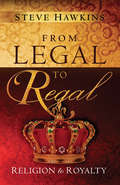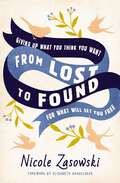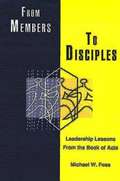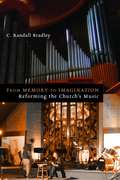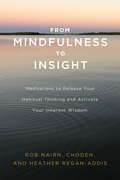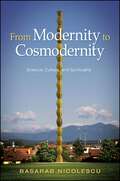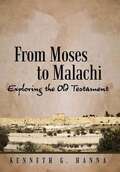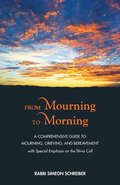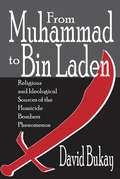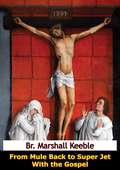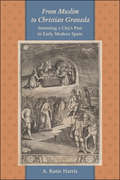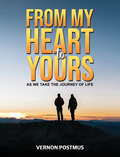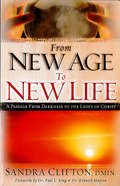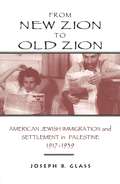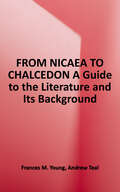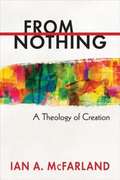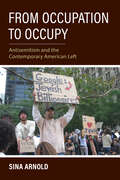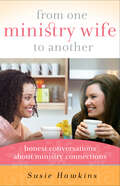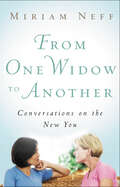- Table View
- List View
From Legal to Regal: Religion to Royalty
by Steve HawkinsSteve Hawkins has a message for every believer longing for a more hope-filled Christian life: “A generous, happy God wants to hang out with you, build you up, teach you personally and show you who you really are in Him!” That’s the heart of his firsthand story about being liberated from legalism into a freedom-filled life in the Spirit. Through biblical illustrations and his own experiences Steve explains: · How to live a fulfilling, not frustrating, Christian life. · Why struggle and failure are not God’s calling for you. · What to do to embrace the kingdom life God promises you. If you’re facing disappointment, unfulfilled expectations or a deep spiritual need, From Legal to Regal will make a believer out of you--you’ll see that you can shift into the new life in Christ you long for.
From Logos to Person: History, Traditions, and Perspectives (Comparative Philosophy of Religion #5)
by Christophe Rico Joaquin PanielloThis contributed volume considers the notions of person and logos from different approaches. Although many treat them separately, this text focuses on their intricated interplay. Drawing upon diverse cultural traditions, including Hebrew, Greek, Latin, and Arab sources, this book engages philologists, philosophers, and theologians through captivating analysis that spans from ancient philosophical perspectives to contemporary scholarship. The genesis of this scholarly endeavor owes to a conference held at the Polis Institute in Jerusalem in October 2021, in collaboration with Johns Hopkins University, Notre Dame University, and the University of Hamburg. Out of fifty-seven presentations, fourteen were selected to compose this thought-provoking volume, ensuring a well-structured exposition on the subject. The opening historical overview provides the framework of the volume, and culminates with Beuchot's intriguing proposition of man as an ‘analogical animal’. Subsequent sections explore the concept of logos, tracing its usage in Plato and the Gospel of Saint John, as well as its evolution through scholasticism, modernism, and contemporary thought. Contained are highlights on the notion of person, its development in various languages, and delves into the intricate connections between rationality, speech, and personhood. Metaphysical and personalist approaches are also presented; this book appeals to researchers and scholars in the field.
From Logos to Trinity
by Marian HillarThis book presents a critical evaluation of the doctrine of the Trinity, tracing its development and investigating the intellectual, philosophical and theological background that shaped this influential doctrine of Christianity. Despite the centrality of Trinitarian thought to Christianity and its importance as one of the fundamental tenets that differentiates Christianity from Judaism and Islam, the doctrine is not fully formulated in the canon of Christian scriptural texts. Instead, it evolved through the conflation of selective pieces of scripture with the philosophical and religious ideas of ancient Hellenistic milieu. Marian Hillar analyzes the development of Trinitarian thought during the formative years of Christianity from its roots in ancient Greek philosophical concepts and religious thinking in the Mediterranean region. He identifies several important sources of Trinitarian thought heretofore largely ignored by scholars, including the Greek middle-Platonic philosophical writings of Numenius and Egyptian metaphysical writings and monuments representing divinity as a triune entity.
From Lost to Found: Giving Up What You Think You Want for What Will Set You Free
by Nicole ZasowskiBeing Lost is the First Step to Getting Found As a marriage and family therapist, one of Nicole Zasowski&’s greatest joys is helping her clients grow in emotional freedom. What she couldn&’t see for many years is that she was living her own life outside of that freedom, clinging to behaviors like shame, performance, and control in order to feel valued and safe.It was only when she was confronted with her own devastating pain and loss that Nicole realized her current way of life was failing her. She then discovered that sometimes God&’s rescue looks like prying our fingers off what we think we want so that we can receive what we truly need. And often, on the far side of pain we don&’t prefer, we find transformation we would not trade. In From Lost to Found, Nicole shares her story as she helps usname what we fear losing most,identify how our reactive behaviors are failing us,discover what joy we can find in letting go, andmove forward in the freedom God has for us.God is writing a story of redemption in your life too. Find out for yourself that sometimes the greatest joy is found when we are drained of all misplaced hope and shallow identities. In the midst of pain or transition, discover a surprising path to healing as you lose your grip on comfort and control—and fall right into God&’s transformative grace.Includes discussion questions for individual reflection or small group study
From Members to Disciples: Leadership Lessons from the Book of Acts
by Michael W. FossThe book of Acts serves as our playbook for ministry as it prepares us for the active presence of God.Studying the book of Arts takes us back to the future. It shows the church how to trust in the active presence of God and inspire people to move from being mere members to bold disciples. As members become disciples of faith, they experience the unstoppable power of disciplined growth and divine purpose in Christian living.
From Memory to Imagination: Reforming the Church's Music (Calvin Institute of Christian Worship Liturgical Studies)
by C. Randall BradleyThe relatively recent "worship wars" over styles of worship — traditional, contemporary, or blended — have calmed down, and many churches have now reached decisions about which "worship style" defines them. At a more fundamental level, however, change has yet to begin.In From Memory to Imagination Randall Bradley argues that fallout from the worship wars needs to be cleaned up and that fundamental cultural changes — namely, the effects of postmodernism — call for new approaches to worship. Outlining imaginative ways for the church to move forward, this book is a must-read for church leaders and anyone interested in worship music.
From Mindfulness to Insight: Meditations to Release Your Habitual Thinking and Activate Your Inherent Wisdom
by Choden Rob Nairn Heather Regan-AddisBuilding on mindfulness and self-compassion practices, this step-by-step guide to secular insight meditation shows the way to freedom from deeply rooted thought patterns.Discover joy within yourself and heartfelt connection with others by releasing the habitual thought patterns that cause suffering and alienation. Drawing on Buddhist wisdom as well as the latest research in psychology and neuroscience, this book provides you with the tools needed to recognize the habits of thinking that fuel anger, desire, jealousy, and pride. Building on mindfulness and self-compassion practice, it offers a step-by-step series of guided meditations that create the conditions for liberating insight and wisdom to naturally arise. Thousands of people in the last decade have benefited from practicing the exercises in this book, which were developed and taught as part of the curriculum at the Mindfulness Association, an organization founded to deliver training in mindfulness, compassion, and insight.
From Modernity to Cosmodernity: Science, Culture, and Spirituality (SUNY series in Western Esoteric Traditions)
by Basarab NicolescuThe quantum, biological, and information revolutions of the twentieth and twenty-first centuries should have thoroughly changed our view of reality, yet the old viewpoint based on classical science remains dominant, reinforcing a notion of a rational, mechanistic world that allows for endless progress. In practice, this view has promoted much violence among humans. Basarab Nicolescu heralds a new era, cosmodernity, founded on a contemporary vision of the interaction between science, culture, spirituality, religion, and society. Here, reality is plastic and its people are active participants in the cosmos, and the world is simultaneously knowable and unknowable. Ultimately, every human recognizes his or her face in the face of every other human being, independent of his or her particular religious or philosophical beliefs. Nicolescu notes a new spirituality free of dogmas and looks at quantum physics, literature, theater, and art to reveal the emergence of a newer, cosmodern consciousness.
From Monk to Money Manager: A Former Monk’s Financial Guide to Becoming a Little Bit Wealthy---and Why That’s Okay
by Doug LynamBuild a better financial future for yourself and the world. Former monk turned financial advisor, Doug Lynam, shares the rules of money management that will change your approach to earning, saving, and investing.From Monk to Money Manager is an entertaining and self-deprecating journey through Lynam’s relationship with the almighty dollar—his childhood in a rich family, the long-haired hippie days running away from materialism, time in the Marine Corps looking for selfless service, and his twenty years in the monastery under a vow of poverty that led to his current profession as a financial advisor. In this unique look at wealth from a spiritual perspective, Lynam shares his belief that God doesn’t expect us to live in poverty. The truth is, we need financial peace so we can help others. When money becomes a part of our spiritual practice, used in love and service, it can bring us closer to our highest spiritual ideals.With humor and humility, Lynam uses stories told through the lens of his own money mistakes, and those of counseling clients, to understand how our attitudes about money hold us back. He also provides clear, step-by-step guidance on how to grow a little bit wealthy. His insights include how to build a compassionate relationship to our finances; some of the good, bad, and ugly truths about money; and the tricks to unlocking financial freedom.
From Moses To Malachi: Exploring The Old Testament
by Kenneth G. HannaFrom Moses to Malachi: Exploring the Old Testament unlocks the Old Testament books and makes clear their central message and enduring value. It helps you to understand the importance of the Old Testament to the authors of the New Testament. The Old Testament was the Scripture used by Jesus and the apostles, and it is foundational to our understanding of who Jesus is, why He came, and what He accomplished during His time here. Through knowledge of the Old Testament, we gain an understanding of God’s purpose in creation, His plan of redemption, and His goal for human history. Knowing the Old Testament increases our understanding of and heightens our appreciation for the New Testament. It also gives us insight into how to apply our faith and live wisely in the contemporary world. From Moses to Malachi introduces each of the thirty-nine books of the Old Testament, using thematic charts to clarify the message of each book at a glance. The key thought and structure of the books and other essential information are presented in graphic form. A synopsis of the content of each book explores its purpose and message. From Moses to Malachi provides pastors and teachers with ideas and outlines for preaching and teaching the Old Testament to a contemporary audience. In addition, it offers numerous references to resource materials and a helpful bibliography for further research.
From Mourning to Morning: A Comprehensive Guide to Mourning, Grieving, and Bereavement
by Simeon SchreiberRabbi Simeon Schreiber, Senior Staff Chaplain at Mount Sinai Medical Center in Miami Beach, translates his many years of experience into a greater understanding of the emotions surrounding death, grieving, mourning, and bereavement in Judaism. From Mourning to Morning presents these principles in a comprehensive format. Focusing on the Shiva, the seven day period of mourning in Judaism, Rabbi Schreiber explains the foundation of visiting a house of mourners, and suggests proper etiquette in conducting a visit. With sensitivity and expertise, Rabbi Schreiber provides unique and practical advise on how to cope with death, mourning, and the related issues that we all will inevitably face.
From Muhammad to Bin Laden: Religious and Ideological Sources of the Homicide Bombers Phenomenon
by David BukayFrom Muhammad to Bin Laden analyzes the ideological, religious, and cultural foundations of one of the most inconceivable phenomena in contemporary world politics. Bukay analyzes the homicide bombings and atrocities perpetuated by worldwide jihad. He also uses information from primary sources to suggest how to cope with this lethal phenomenon.The book explores the meaning and interpretation of the seemingly benign concept of da'wah, the expansion of the Islamic community. Da'wah provides the religious and ideological justification for the lethal phenomenon of worldwide jihad; it describes the incentive and motivational drive that support the emergence and the operation of the fundamentalist Islamic movement. Bukay locates the dimensions of the phenomenon of jihad as well as the reasons, motivations, and aspects of the behavior of fundamentalist groups. The importance of this work lies in its skillful combination of historical perspectives and contemporary dynamics, religious and anthropological aspects of the phenomena, and its use of research tools of both the humanities and social sciences.By exploring the religious and cultural foundations of homicide bombers' activities, Bukay explains the essence of jihad, how it is connected to the da'wah, and together, how da'wah and jihad serve as the platform of the current worldwide terrorist activities. Bukay quotes religious edicts and declarations of classical and modern Islamic texts, as well as contemporary Islamic fanatic movements from Ibn Hanbal in the eighth century to Sayyid Qutb in the mid-twentieth century. He also aims to bring to the world's consciousness the aims and objectives of fundamentalist Islam. The volume concludes by challenging the free world to wake up before the bells of another world war start to ring. From Muhammad to Bin Laden will interest scholars, policymakers, and lay readers. Its importance is transparent, particularly in light of the current developments in the Middle East.
From Mule Back to Super Jet with the Gospel
by Br. Marshall KeebleOriginally published in 1962, this is the fascinating account of Brother Marshall Keeble’s missionary journey to Africa with Brother Lucien Palmer in 1960, including a visit to the Holy Land, Palestine.“This was Brother Keeble’s greatest missionary journey for the Lord, and he has made many journeys. On this trip he preached with great power. His influence was felt and it will live on in Africa, as he now has sons and daughters in the Gospel in that far away land, and through them the work of our Lord will continue.[…]“With great joy the experiences had by Brother Keeble on this journey have been written, and he hopes you will find much pleasure in this narrative. May it cause you to have a great increase of faith to use the jet age to God’s glory in advancing his kingdom in every nation of the world.”—Lucien Palmer, Preface
From Muslim to Christian Granada: Inventing a City's Past in Early Modern Spain (The Johns Hopkins University Studies in Historical and Political Science #125)
by A. Katie HarrisHonorable Mention, 2010 Best First Book, Association for Spanish and Portuguese Historical StudiesIn 1492, Granada, the last independent Muslim city on the Iberian Peninsula, fell to the Catholic forces of Ferdinand and Isabella. A century later, in 1595, treasure hunters unearthed some curious lead tablets inscribed in Arabic. The tablets documented the evangelization of Granada in the first century A.D. by St. Cecilio, the city’s first bishop. Granadinos greeted these curious documents, known as the plomos, and the human remains accompanying them as proof that their city—best known as the last outpost of Spanish Islam—was in truth Iberia’s most ancient Christian settlement. Critics, however, pointed to the documents’ questionable doctrinal content and historical anachronisms. In 1682, the pope condemned the plomos as forgeries.From Muslim to Christian Granada explores how the people of Granada created a new civic identity around these famous forgeries. Through an analysis of the sermons, ceremonies, histories, maps, and devotions that developed around the plomos, it examines the symbolic and mythological aspects of a new historical terrain upon which Granadinos located themselves and their city. Discussing the ways in which one local community’s collective identity was constructed and maintained, this work complements ongoing scholarship concerning the development of communal identities in modern Europe. Through its focus on the intersections of local religion and local identity, it offers new perspectives on the impact and implementation of Counter-Reformation Catholicism.
From My Briefcase
by David C. GibbsFrom the Introduction: "In this book, I have pulled out what was written in airplanes, motels, and courtrooms across America. Many chapters were written as I traveled through the night. My prayer is that what has come from my briefcase in over twenty years of defending Christians will be used to encourage, instruct, and above all else, honor the wonderful name of my Lord and Savior, Jesus Christ."
From My Heart to Yours: As We Take the Journey of Life
by Vernon PostmusEmbark on a stirring odyssey through rhythm and rhyme, where every verse resonates with profound reflections and deep insight. Experience the rhythmic cadence of life. Be captured by the enchantment of words. Unveil just a little something of God’s design for life. Every poem in this collection is infused with a deeply Christian message, offering solace and encouragement. Pause, reflect, and let the words seep into your soul. Will this book captivate you so deeply that setting it aside becomes a challenge? Embark on this voyage, and may it bless your own life’s journey.
From New Age To New Life: A Passage from Darkness to the Light of Christ
by Sandra Clifton&“Whether or not you believe that psychics are real is not the point of this book,&” writes Clifton. &“Obviously there is ongoing appeal for such things, or God&’s Word would not keep warning against them. The point of my book is to show triumph over sin and darkness.&”The former professional psychic, then known as Sandra McNeil, reveals the true nature of New Age thought and practices and how God opened her eyes to deception and set her free. She presents practical insight for tactful dialogue with individuals caught in the web of such beliefs, as well as tips for intercessory prayer. The inclusion of prayer strategies and discussion questions makes From New Age to New Life both theological and practical.With great experience as an author and editor, as well as a doctorate of ministry from Oral Roberts University, Clifton does an excellent job of telling her story in five significant parts: &“My Journey,&” &“Reflections,&” &“What Can Be Done?&” &“Prayer Strategies,&” and &“Talking It Over.&” Like sharing snapshots from a trip, she also includes distinct scenes from her life. Each is followed by reflection, in which she looks back on her experiences or thoughts with theological and biblical perspectives. In the process, she addresses how to help lost people out of the occult and New Age.Readers of this wonderfully written book will come away feeling warm inside knowing good still comes out on top.
From New Zion to Old Zion: American Jewish Immigration and Settlement in Palestine, 1917-1939 (American Holy Land Series)
by Joseph B. GlassAmerican Aliyah (immigration to Palestine) began in the mid-nineteenth century fueled by the desire of American Jews to study Torah and by their wish to live and be buried in the Holy Land. His movement of people-men and women-increased between World War I and II, in direct contrast to European Jewry's desire to immigrate to the United States. Why would American Jews want to leave America, and what characterized their resettlement? From New Zion to Old Zion analyzes the migration of American Jews to Palestine between the two world wars and explores the contribution of these settlers to the building of Palestine. <P><P> From New Zion to Old Zion draws upon international archival correspondence, newspapers, maps, photographs, interviews, and fieldwork to provide students and scholars of immigration and settlement processes, the Yishuv (Jewish community in Palestine), and America-Holy Land studies a well-researched portrait of Aliyah.
From Nicaea to Chalcedon: A Guide to the Literature and Its Background
by Frances M. YoungIn this volume, a world-renowned scholar of early Christianity updates and expands her classic survey of the writers and writings of the golden age of Greek patristic theology. This reliable guide to Christian literature from the late third century to the mid-fifth century is more accessible than specialized works on individual authors but more informative than coverage provided by general histories and reference works. The second edition has been revised throughout for use by a new generation of students and scholars and includes a new chapter and updated bibliographies.
From Nothing
by Ian A. McfarlandToo often the doctrine of creation has been made to serve limited or pointless ends, like the well-worn arguments between science and faith over the question of human and cosmic origins. Given this history, some might be tempted to ignore the theology of creation, thinking it has nothing new or substantive to say. They would be wrong. In this stimulating volume, Ian A. McFarland shows that at the heart of the doctrine of creation lies an essential truth about humanity: we are completely dependent on God. Apart from this realization, little else about us makes sense. McFarland demonstrates that this radical dependence is a consequence of the doctrine of creatio ex nihilo, creation from nothing. Taking up the theological consequences of creation--theodicy and Providence--the author provides a detailed and innovative constructive theology of creation. Drawing on the biblical text, classical sources, and contemporary thought, From Nothing proves that a robust theology of creation is a necessary correlate to the Christian confession of redemption in Jesus Christ.
From Occupation to Occupy: Antisemitism and the Contemporary American Left (Studies in Antisemitism)
by Sina ArnoldThe recent rise of antisemitism in the United States has been well documented and linked to groups and ideologies associated with the far right. In From Occupation to Occupy, Sina Arnold argues that antisemitism can also be found as an "invisible prejudice" on the left. Based on participation in left-wing events and demonstrations, interviews with activists, and analysis of left-wing social movement literature, Arnold argues that a pattern for enabling antisemitism exists. Although open antisemitism on the left is very rare, there are recurring instances of "antisemitic trivialization," in which antisemitism is not perceived as a relevant issue in its own right, leading to a lack of empathy for Jewish concerns and grievances. Arnold's research also reveals a pervasive defensiveness against accusations of antisemitism in left-wing politics, with activists fiercely dismissing the possibility of prejudice against Jews within their movements and invariably shifting discussions to critiques of Israel or other forms of racism. From Occupation to Occupy offers potential remedies for this situation and suggests that a progressive political movement that takes antisemitism seriously can be a powerful force for change in the United States.
From One Ministry Wife to Another: Honest Conversations about Ministry Connections
by Susie HawkinsWhen a church hires a new minister, they are really hiring both him and his wife. Many women entering this role for the first time have never considered what it means to be a minister's wife and consequently suffer stress, chaos, and confusion. In order to thrive, she needs a solid understanding of the biblical teaching on her role and how to best serve her husband as he fulfills his role.Susie Hawkins brings thirty years of experience as a minister's wife coupled with her role as the mother of two ministry wives. By focusing on key relationships and responsibilities in relation to the church and home, Susie guides young women to a greater understanding of how to serve God faithfully as the wife of a minister.
From One Ministry Wife to Another: Honest Conversations about Ministry Connections
by Susie HawkinsWhen a church hires a new minister, they are really hiring both him and his wife. Many women entering this role for the first time have never considered what it means to be a minister's wife and consequently suffer stress, chaos, and confusion. In order to thrive, she needs a solid understanding of the biblical teaching on her role and how to best serve her husband as he fulfills his role.Susie Hawkins brings thirty years of experience as a minister's wife coupled with her role as the mother of two ministry wives. By focusing on key relationships and responsibilities in relation to the church and home, Susie guides young women to a greater understanding of how to serve God faithfully as the wife of a minister.
From One Widow to Another: Conversations on the New You
by Miriam Neff"Widow" is one title women do not want to have. Yet, according to the Surgeon General&’s office, 800,000 people become widows or widowers every year in the United States alone. Every aspect of a widow&’s existence changes—like it or not, ready or not. These changes add to the emotional roller coaster that most women experience after losing their husband. Miriam Neff understands the ride. As she struggled to understand and accept her new role after her husband&’s death, she recognized the need for women to hear from others about their experiences and what helped them transition to this new stage of life. From One Widow to Another offers practical advice for those facing the loss of a spouse. Drawing from her own loss, Neff walks with the reader through practical issues to a sense of encouragement.
From One Widow to Another: Conversations on the New You
by Miriam Neff"Widow" is one title women do not want to have. Yet, according to the Surgeon General&’s office, 800,000 people become widows or widowers every year in the United States alone. Every aspect of a widow&’s existence changes—like it or not, ready or not. These changes add to the emotional roller coaster that most women experience after losing their husband. Miriam Neff understands the ride. As she struggled to understand and accept her new role after her husband&’s death, she recognized the need for women to hear from others about their experiences and what helped them transition to this new stage of life. From One Widow to Another offers practical advice for those facing the loss of a spouse. Drawing from her own loss, Neff walks with the reader through practical issues to a sense of encouragement.
